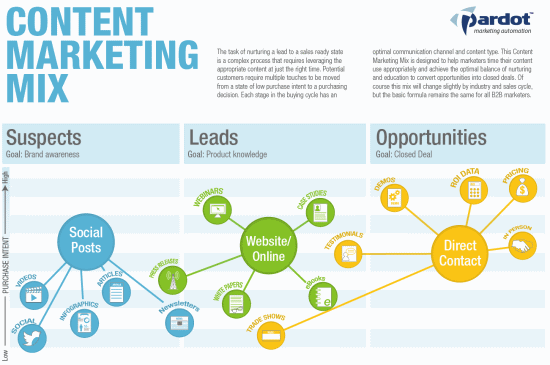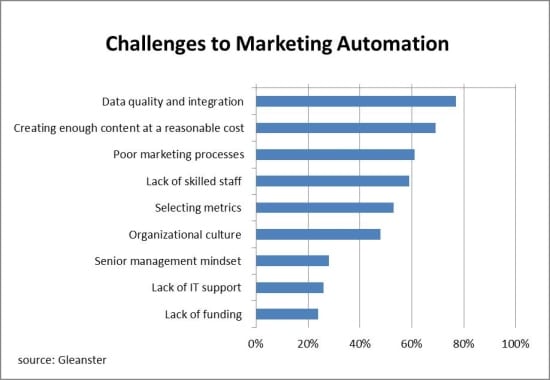Marketers realize that an omnichannel customer can only be served properly when having a single customer view. The rapid growth of the marketing automation market has proven that increasing awareness.
Omnichannel, multi-channel, whatever you call it: all channels matter in the buying journey. Some channels are more popular among specific target audiences or during specific stages of the path to purchase but in the end they all are important as buyers consult several content sources and information channels.
As no business has one typical customer with one static channel preference, buying behavior or media consumption pattern, cross-channel marketing automation tools have taken a high flight.
Although some vendors like to invent new terms to describe their solutions, marketing automation is what it is: a mix of technology and tactics to have a single view on customers and prospects and to be where customers are at any given time in the customer life cycle with clear goals in a customer-centric and – somewhat – automated manner. Pre-purchase, during the buy and after it.
And what’s one of the keys towards success? Relevant content. In the end marketing automating is also about providing the right content/information/offers at the right time across the right channels to the right audiences for the right platforms and reasons in a tailored/segmented/personalized way. So, content marketing as well indeed.

Content marketing and marketing automation: on gasoline
I have been working with several marketing automation vendors and – more importantly – talking and working with many of their customers. And it’s striking to see how many undervalue – or at least under-emphasize – the crucial role of content.
Most of them actually struggle with finding relevant content in both dialog marketing in general and in email marketing, still the main way businesses use their marketing automation platforms. Indeed, the number of business that is ready to fully deploy marketing automation is still relatively low. In the end, we’re often mainly talking about email marketing – and a bit of social and mobile but relatively limited – in practice.
Are marketing automation vendors to blame? No. Although aggressive sales practices, over-promising and not helping marketers to fully use their marketing automation tools to generate value, do play a role. Furthermore, marketing automation is not a holy grail.
If the people, processes, resources, human intervention, common sense (think about lead scoring, for instance) and organizational and cultural ‘musts’ aren’t there, marketing automation simply fails. When the attention for content and content marketing is not there: same story.
Marketing automation vendors have to take up their role in that regard and not promise you a Rolls Royce when there’s no destination to drive to (the goals, the audiences), no driver (the teams and processes) and no gasoline (the content) in your company to start with.
Furthermore, in a growing and highly competitive market, marketing automation vendors focus a lot on aggressive acquisition and sales. True, content marketing is important and even underestimated in lead generation but it’s not just about that.
Aggressive acquisition can lead to poor service for existing customers. Sometimes, the lead gen activity of some vendors – and other businesses as well, for that matter – is more like an absurd mania asking data in return for close to “nada”. In one of our Google+ communities I once mentioned an example whereby even for a very basic and silly editorial calendar in Excel, one marketing automation vendor, HubSpot, (I’m a customer so, no harm) requires registration. Where does this end? Is that obsession with a form for everything relevant and where is the quid pro quo? Isn’t this one of the causes of content marketing failure?
There are many others with similar practices – and often even worse practices. Some marketing automation vendors don’t follow up and empower existing customers enough, with high churn rates and failures as a result. You need that follow-up, strategic advice and certainly content marketing plan that’s inevitable in any (B2B) marketing automation project as an end customer of the marketing automation platform you use. Especially as content ranks high among the main challenges to marketing automation as the chart below shows.

Content is the glue of marketing automation
As a matter of fact, the main reason why marketing automation fails, has everything to do with content marketing or better: a lack of it.
While content is the glue in all marketing automation processes and in virtually all stages of the buying journey, you would be amazed to know how few businesses using marketing automation, actually have a content marketing strategy, let alone identified their buying personas, analyzed their content gaps or conducted a touchpoint mapping exercise with clear KPIs.
Don’t get me wrong: marketing automation is not about deploying everything right away, it is a staged approach in most cases. But at the very least you start by having a customer-oriented strategy, including a content marketing strategy. And at the very least you are also on the main channels where prospects and customers want to interact with you in this day and age.
There are of course other reasons why marketing automation often fails and I will cover those that are related with content and content marketing in later posts. But guess what. Most of the reasons why marketing automation fails are effectively about content marketing, processes and resources.
Pick a partner that knows the role of content marketing
It’s a recurring theme each time I talk with B2B marketing colleagues that partner with a marketing automation vendor: the absence of collaboration within the businesses that use marketing automation, including an amazing lack of solid content strategies and content marketing strategies, often combined with a lack of the content they need for their goals and for their customers/prospects.
In some cases, the marketing automation vendors are to blame as well, they don’t give the example. While some of them , such as Pardot (now ExactTarget), Marketo, Eloqua and HubSpot have been showing the way in content marketing, – with the necessary mistakes – others have social media and content marketing strategies that are not strategies but simply an attitude of sharing as much self-serving content as possible.
It’s about them, their great solutions and press releases, purely self-absorbed. It’s rarely about the questions of the prospects that can be solved. However, that’s a content marketing mistake more businesses make. This approach is often characterized by an undervaluation of digital and social channels in buying journeys and by a pure hard selling face-to-face approach. It might work on the short term and on a small scale but it’s disastrous for the competitive position and long term. Furthermore, the ‘pipe’ doesn’t get filled and properly followed up, leading to missed revenues.
Some advice: think before choosing a marketing automation provider/agency/consultant and if you pick one make sure you check out how to put their customers in the center by effectively valuing content and content marketing, as ways to persuade, help, guide and serve customers/prospects across their whole life cycle.
- Are the people you will work with proactively using content marketing and social media marketing themselves? Do they practice what they preach?
- Is the content marketing strategy of the marketing automation vendor and/or its partner – about you and your needs, as a prospect, or all about them? The more it is about your needs, the more they might be in helping you succeed of just themselves.
- Is their blog only about themselves? Does it respond to the questions you have? Are several people blogging? Same question for their social media presences and the way they communicate in general? And what about the website? Is it built around buyer personas or around the strict message and organization of the vendor or partner?
- Is the content marketing strategy of your marketing automation vendor and/or partner just about the beginning of the life cycle (attention, awareness, reach,…) or is it also looking at the pre-purchase stages, and – more importantly – about the middle? Because it’s in the middle, between awareness and purchase that most content marketing fails.
- Can the content marketing automation vendor and certainly his potential agency/partner provide you with solid content marketing advice and actually provide services enabling you to define a strategy and succeed? Because today that’s – just a small part of – your hidden marketing automation cost. It’s not always their task to do that, at least not for free. But know that you will need it and that at no time the cost of the marketing automation solution should block you from putting your content, content & content marketing strategy and thus customer and goals where they really belong: in the middle of it all. You need to know that and your partner needs to tell you if he doesn’t just want to sell you a license and some consulting. All the rest is technology.
Again, your marketing automation partner has a responsibility in being clear about this, it’s not just about technology and selling licenses.
To succeed in demand generation, lead generation/nurturing, conversion and customer relationships today, you need a solid content marketing approach or your marketing automation will fail. It’s that simple. The reason? It’s all about the customer experience.

